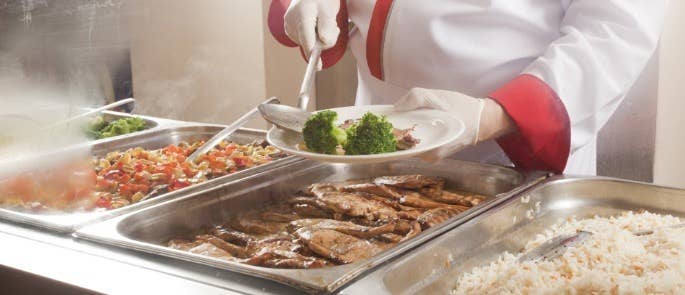What are the Food Hygiene Requirements in a School?
Schools are subject to inspection by the FSA (Food Standards Agency) who make sure they have suitable food hygiene requirements in place. It is a legal requirement for people who work with food to have received appropriate training. With a knowledge of the potential dangers, food handlers in schools can prevent illnesses and even threats to life.
Need a Course?
High Speed Training have a number of Food Hygiene Training Courses that you can complete online and at your convenience. From Level 2 Food Safety & Hygiene to Food Allergen Awareness, you will find a range of training suitable for food handlers in schools.
Why is Food Hygiene So Important in Schools?
Most people know that maintaining high food hygiene standards is important to prevent cross-contamination and subsequent illness. In busy places such as schools, it is imperative that both food handlers and other staff are aware of the specific risks related to that environment. These include allergens, dietary requirements, and the mass production of meals that are left out for long periods of time.

Allergens
Allergens are foods that trigger an unusual response in the body’s immune system when some people come into contact with them. This weakens their immune system and makes them ill.
In a school, all school staff should know what the main allergens are and the measures they should take to minimise the risks. This is because there are potentially many food handlers, such as kitchen staff and servers, teachers, and even pupils (or their parents). They should all consider the impact this may have and their responsibility to control allergens. Following food hygiene procedures, such as a thorough cleaning process, will limit the risk of cross-contamination of allergens.
What are Allergens?
The fourteen allergens that you must be aware of are:
- Celery
- Cereals that contain gluten (e.g. wheat, rye, barley and oats).
- Crustaceans (e.g. prawns, crabs and lobsters).
- Eggs.
- Fish.
- Lupin.
- Milk.
- Molluscs (e.g. mussels and oysters).
- Mustard.
- Tree nuts (e.g. almonds, cashews, hazelnuts, pecans and walnuts).
- Peanuts (these are not included under nuts because they are a legume).
- Sesame seeds.
- Soybeans.
- Sulphur dioxide and sulphites (e.g. additives and preservatives present in dried fruit or fizzy drinks, if they are at a concentration of more than 10mg per kg or per litre).

Dietary Requirements
It is not a legal requirement to provide food that satisfies all dietary requirements. However, if you advertise food as being suitable for a certain dietary need then this must be accurate. By following food hygiene regulations, you stop cross-contamination and ensure food that is presented as vegetarian, for example, actually is.
Below is a summary of the most common dietary requirements that schools may consider providing for.
Food Intolerances
An intolerance to a particular food refers to the problem some people experience with digesting it. Symptoms that follow include bloating, stomach pain, or a physical rash appearing a few hours after consumption. This is different to a food allergy, as symptoms develop more slowly, and can’t be fatal.
Coeliac Disease
Coeliac disease is different to an allergy or an intolerance to gluten. It is an autoimmune condition where the immune system attacks healthy tissue that it mistakes as infectious. When a person eats gluten, it disrupts the digestive system and the small intestine loses its absorption function. Gluten is commonly found in bread, pasta and cake and the disease causes bloating, abdominal pain and diarrhoea.
Vegetarian & Vegan
There are different types of vegetarians, but the most common is lacto-ovo-vegetarians. They avoid eating meat, poultry, fish, shellfish and any foods that contain by-products of animals. Pupils may instead be pescatarian, meaning they don’t eat meat but do eat fish. A vegan diet is the same as vegetarian but also excludes any product associated with animals, including dairy and eggs.
Religious Beliefs
Some pupils may have dietary requirements due to their religious beliefs. Halal and kosher foods conform to Islamic and Jewish teachings respectively. If your school does offer these it’s crucial as a food handler to provide food that is actually what you claim it to be. You must take special care with food that is halal or kosher by storing, preparing, cooking and serving it to strict standards. This may include the use of separate chopping boards and fridges, for example. Taking such precautions eliminates any possibility of cross-contamination with foods that are not halal or kosher.
Your school will consider factors such as how many children will benefit from special provisions when deciding whether to cater for special dietary requirements.

Food Left Out for a Duration of Time
If you leave food out for a long time you must monitor its temperature. A change in temperature may make conditions suitable for harmful bacteria to grow, increasing the chances of people becoming ill from food poisoning. School lunches are often served hot and are kept out for at least an hour. The food temperature must be maintained above 63°C to avoid the danger zone of 20°C to 50°C at which bacteria multiplies. As a food server carrying out this task, you are responsible for working safely by following your school’s procedures and any training you’ve received.
Food handlers, and especially food servers in schools, must keep the serving area clean. This not only prevents food wastage, it also reduces the risk of cross-contamination in canteens. Cleanliness prevents bacteria from multiplying to a dangerous level that can then cause food poisoning.

Remember, schools are inspected by the FSA and will receive a subsequent food hygiene rating.
The following section explains the food hygiene training requirements in schools in more detail, focusing on the different roles in a school.
What are the Food Hygiene Training Requirements in Schools?
The law states that food handlers need “appropriate training” but the form this takes can vary. The FSA considers training programmes as one way to fulfil food hygiene training requirements. Schools will have one or a combination of these training requirements in place to protect pupils from food-related illness and to demonstrate due diligence to the FSA. Due diligence refers to the school’s ability to prove that every possible measure has been put in place and followed to ensure a high food hygiene standard.
Kitchen Staff & Food Servers
Kitchen staff and food servers are responsible for preparing and serving food, so it’s important that they are aware of food hygiene procedures. If you carry out this role you may benefit from training such as Level 2 Food Safety & Hygiene training. This will explain the potential risks and how you can avoid them through food hygiene measures. Kitchen staff may also benefit from Hazard Analysis and Critical Control Point (HACCP) training. HACCP are internationally recognised systems that control various hazards that arise during the handling of food. We offer an online training course which could be useful for your school kitchen.
Teachers & Staff
If you are a teacher or other member of school staff, you may also benefit from food hygiene training. For example, if you are cooking with children in lessons you must maintain high food hygiene standards. This not only prevents illness, it also encourages the children to follow your lead. Also, teachers may provide their pupils with food as a reward for good behaviour and so must understand how to manage any potential risks.
As with kitchen staff, it is important that school staff are aware of the risk of allergens, dietary requirements and how to safely work with both food and children. An understanding of the correct food hygiene procedures is essential to make sure you are carrying out practices safely and minimising threats to health. If you are not employed in a food handler position. If you are not employed in a food handler position awareness level training will be sufficient, such as Allergen Awareness.
Parents & Carers
Parents and carers are largely responsible for what foods their (particularly young) children bring into school. Pupils who bring in packed lunches introduce all kinds of allergens into schools, but it is, of course, impossible to restrict this. However, there are preventative steps that you can take in instances of, for example, bake sales. Food brought in from home may unintentionally be contaminated with nuts and, if not correctly labelled, this could have disastrous consequences for a pupil with a nut allergy. While there is no legal obligation to provide allergen information in these instances, it is considered best practice to do so, or at least be able to provide it when asked.
Our helpful food allergen labels guide provides more detail about and includes downloadable labels that you can fill in yourself and use for bake sales, in your school canteen and stick on tuck shop items.

This article has identified the main potential risks to food hygiene in schools and what training is either required or expected of specific food handlers. Your employer should have training procedures in place that ensure you know how to reduce the risk of illness and cross-contamination.
What to Read Next
- Avoiding Cross Contamination in the Kitchen
- The Importance of Food Hygiene Training
- What is a School Breakfast Club?
- Education Landing Page











